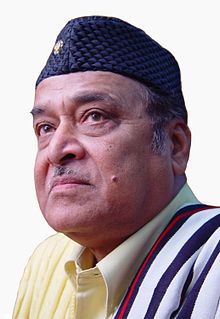Bhupen Hazarika
Bhupen Hazarika was an Indian lyricist, musician, singer, poet and filmmaker from Assam. His songs, written and sung mainly in the Assamese language by himself, are marked by humanity and universal brotherhood and have been translated and sung in many languages, most notably in Bengali and Hindi. His songs, based on the themes of communal amity, universal justice and empathy, have become popular among the people of Assam, besides West Bengal and Bangladesh. He is also acknowledged to have introduced the culture and folk music of Assam and Northeast India to Hindi cinema at the national level. He received the National Film Award for Best Music Direction in 1975. Recipient of Sangeet Natak Akademi Award , Padmashri , and Padmabhushan , Hazarika was awarded with Dada Saheb Phalke Award , Indias highest award in cinema, by the Government of India and Sangeet Natak Akademi Fellowship , the highest award of the Sangeet Natak Akademi, Indias The National Academy for Music, Dance and Drama.
Hazarika was born onSeptember 1926 to Nilakanta and Shantipriya Hazarika in Sadiya , Assam. His father was originally from Nazira, a town located in Sivasagar district. The eldest of ten children, Bhupen Hazarika was exposed to the musical influence of his mother, who exposed him to lullabies and traditional Music of Assam. His father moved to the Bharalumukh region of Guwahati in 1929, in search of better prospects, where Bhupen Hazarika spent his early childhood. In 1932 his father further moved to Dhubri, and in 1935 to Tezpur. It was in Tezpur that Bhupen Hazarika, thenyears of age, was discovered by Jyotiprasad Agarwala, the noted Assamese lyricist, playwright and the first Assames Filmmaker and Bishnu Prasad Rabha, renowned Assamese artist and revolutionary poet, where he sang a Borgeet , taught by his mother at a public function. In 1936, Bhupen Hazarika accompanied them to Kolkata where he recorded his first song at the Aurora Studio for the Selona Company. His associat
Source: Wikipedia

